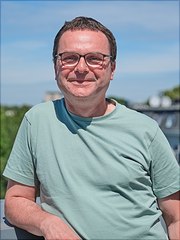Prof. Dr. Kai-Uwe Schnapp

Photo: Carolin Scharfenberg
Professor of political science, especially methods | Dean of the Faculty of Business, Economics, and Social Sciences
Address
Office
Contact
Note
Prof. Dr Kai-Uwe Schnapp was appointed Dean of the Faculty of Business, Economics and Social Sciences on 1 May 2025. During the five years of his term of office as Dean, his work as a professor in the Department of Political Science will therefore be suspended. Click here for the website of the Dean's Office.
Professional background
Kai-Uwe Schnapp studied political science in Berlin and political and administrative science in Minneapolis. He received his doctorate on the topic of "Ministerial Bureaucracies in Western Democracies" at the Free University of Berlin. After his studies, he worked at the Social Science Research Center Berlin (WZB), the Otto-Friedrich-University Bamberg, the Martin-Luther-University Halle/Wittenberg, and the University of Hamburg. Schnapp has been a professor of political science, especially methods, at the University of Hamburg since 2008. Since May 2025, he has been the Dean of the Faculty of Business, Economics, and Social Sciences.
Important information regarding consultation hours
Due to my role as Dean of the Faculty of Business, Economics and Social Sciences, from May 2025 onwards, my consultation hours will be available only in urgent cases (e.g. for supervising theses that have already been approved). Appointments can be made by email.(kai-uwe.schnapp"AT"uni-hamburg.de)
General instructions and downloads for students
In the download area for students, you will find information on how to write term papers, on citing correctly, as well as the evaluation grid for term papers and final papers [in German]. They apply to my research area, Methods in Political Science.
Current teaching
Winter term 2024/2025
Teaching-oriented
Already in Halle, Kai-Uwe Schnapp was primarily concerned with methodological issues in teaching. There, he also began to deal in detail with questions of didactics, because methods training poses special challenges here. This commitment has continued in Hamburg. Two concrete results of the focus on teaching issues are the introduction of a lecture hall voting system at the Wiso Faculty of the UHH, which was implemented together with the E-Learning Office, and the founding of the Project Office for Applied Social Research (since 2022 Research Office for Social Innovation - ROSI), which brings practice partners and practice projects for social science teaching to the university. Schnapp regularly teaches in the program of the Hamburg Center for University Teaching and Learning (HUL) and is co-spokesperson of the Digital and Data Literacy in Teaching and Learning Lab, which is funded by the Foundation Innovation in University Teaching (Stiftung Innovation in der Hochschullehre). He has twice received the Teaching Award of the State of Hamburg.
Research-oriented
In addition to his work in the DFG Research Group Need-Based Justice and Distribution Procedures, Kai-Uwe Schnapp is conducting research in the UHH Climate Cluster on the influence of administrative actors and interest groups on policy decisions in the context of the EU ETS. He is also working in a DFG project together with Heike Klüver (HU Berlin) on the influence of associations on the development of laws in federal ministerial administration in the Federal Republic of Germany. He is a co-spokesperson of the UHH project Digital and Data Literacy in Teaching and Learning Lab (DDLitLab) funded by the Foundation Innovation in Higher Education (Stiftung Innovation in der Hochschullehre).
Curriculum Vitae
Born 1966 in Wolgast/Mecklenburg-Western Pomerania
Academic Career
- 2002: Doctorate (Dr. rer. pol.) at the FU Berlin with the lecture "'Activating State' and 'Civil Society'. Can the decentralization of administrative responsibility be a means to satisfy citizens' increased demands for participation?" Title of the doctoral thesis: "Political Influence of Ministerial Bureaucracies in Western Democracies. A comparative analysis of the potential of ministerial bureaucracies to influence political decision-making processes in twenty-one OECD countries".
- 1992–1993: University of Minnesota: Political Science and Public Administration (scholarship-interchange between the universities of Berlin and Minnesota)
- 1990–1995: Political Sciences studies at the Freie Universität Berlin. Subject of the diploma thesis: "The Political Function of Bureaucratic Leadership Groups at a National Level. A comparison between the USA, the Federal Republic of Germany and Great Britain", Rating: "Very good"
- 1988– 1990: Hochschule für Ökonomie Berlin (GDR): Political Economy
Professional Activity
- Since 05/2025: Dean of the Faculty of Business, Economics, and Social Sciences
- Since 2008: Professor for Political Science, especially Methods at the University of Hamburg
- Summer term 2008: Substitute professor for Methods of Political Science at the University of Hamburg
- Summer term 2007: Substitute professor for Methods of Political Science at the University of Hamburg
- 2002–2008: Research associate at Martin-Luther-Universität Halle-Wittenberg (teaching area Methods of Political Science)
- 2001–2002: Research associate at the chair Political Systems (Prof. Dr. Ursula Hoffmann-Lange) at Otto-Friedrich-Universität Bamberg
- 1996–2001: Research associate at the Berlin Social Science Center (WZB) in the department "Institutions and Social Change" (Director: Prof. Dr. Hans-Dieter Klingemann)
- 1995–1996: Research associate for the DFG-Project "German Elites Survey 1995-96" at Universität Potsdam (project head: Prof. Dr. Wilhelm Bürklin)
- 1991–1995: Student assistant Hilfskraft at the Berlin Social Science Center (WZB) in the department "Institutions and Social Change"
Current Positions
- Since 2022: Scientific director of the Research Office for Social Innovation (ROSI)
- Since 2021: Co-spokesperson of the Digital and Data Literacy in Teaching Lab (DDLitLab) (together with Prof. Dr. Katharina Kleinen-von Königslöw)
- Since 2020: Member of the Academic Senate of the University of Hamburg
- Since 2012: Program director Political Science (B. A. and M. A. programs)
- Since 2011: Member of the preparatory team for the Wahl-o-Mat for the Hamburg state parliament elections
- Since 2007: Liaison lecturer for the Heinrich Böll Foundation
- Seit 2006: Member of the Scientific Board of the "Sustainable Governance Indicators" of the Bertelsmann Foundation
Prior Positions
- 2015–2021: Member of the editorial team of the Politischen Vierteljahresschrift (journal of the German Political Science Association, DVPW)
- 2010–2022: Director of the Project Office for Applied Social Research (today: ROSI)
